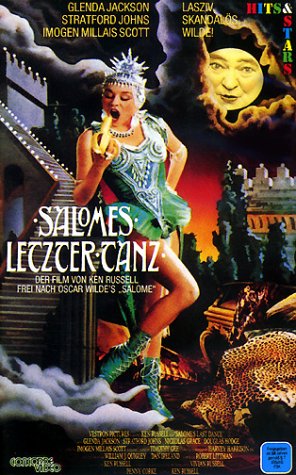
Salome's Last Dance Page #4
- R
- Year:
- 1988
- 89 min
- 296 Views
oppressor has been broken!
From the serpent's egg
will come the basilisk..
and he who is formed from it,
will devour the birds!
What a strange voice!
I'm afraid that's impossible, Princess! The
Tetrarch doesn't wish us to speak to him.
He has forbidden even
the High Priest to speak to him!
I want to speak to him.
It's impossible, Princess!
- I want to!
Indeed, Princess! It would be
better to return to the banquet.
I have always been nice to you!
You will do it, won't you?
I only want to look at him,
this strange prophet.
talk about him.
I think the Tetrarch is afraid of him.
I am sure he is afraid of him!
And you, Narraboth?
Are you afraid of him too?
I'm not afraid of him, Princess.
I'm afraid of no one!
But the Tetrarch has officially
forbidden us to release him from the well.
You will do this for me, Narraboth!
and tomorrow, when I pass in my litter..
under the arch of the vendors of idols,
I will drop a little flower for you,
Princess, I can't!
I can't!
You will do this for me, Narraboth!
You know, you will do this for me.
and tomorrow when I pass over the
bridge of the vendors of idols,
I will look..
at you!
Through my muslin veils..
I will look at you!
We dare not, Princess!
How dark it is down there!
He must be terrible,
to be in a place so black!
It's like a tomb!
Didn't you hear me?
Let him out!
I want to see him!
I beg you, Princess,
don't ask this of us!
Don't keep me waiting!
Princess, our lives belong to you,
but we cannot do what you ask!
In any case, um.. it's not
we who you must ask.
Oh, what is going to happen? I am sure
something terrible is going to happen!
You will do it for me,
won't you, Narraboth?
You will do it.. for me.
Narraboth!
I will smile at you.. perhaps..
Look at me, Narraboth, look at me!
You know full well you will
do what I ask of you!
You know it, don't you?
Me.. I know it.
Send up the Prophet..
the Princess wishes to see him!
Send up the Prophet!
Oh, how strange the moon looks tonight!
Through the clouds of muslin,
she smiles like a little princess..
like a princess with amber eyes!
Tell him to come out! So that he may hear the
voice of he who has shouted in the deserts!
And in the palaces of kings!
Whom does he mean?
- We never know, Princess!
Where is she..
painted on city walls..
pictures of Chaldeans etched in color..
gave way to lust and
sent envoys to Chaldea?
He is speaking about my mother!
- No, Princess!
Yes! It's about mother!
Where is she who gave herself
Translation
Translate and read this script in other languages:
Select another language:
- - Select -
- 简体中文 (Chinese - Simplified)
- 繁體中文 (Chinese - Traditional)
- Español (Spanish)
- Esperanto (Esperanto)
- 日本語 (Japanese)
- Português (Portuguese)
- Deutsch (German)
- العربية (Arabic)
- Français (French)
- Русский (Russian)
- ಕನ್ನಡ (Kannada)
- 한국어 (Korean)
- עברית (Hebrew)
- Gaeilge (Irish)
- Українська (Ukrainian)
- اردو (Urdu)
- Magyar (Hungarian)
- मानक हिन्दी (Hindi)
- Indonesia (Indonesian)
- Italiano (Italian)
- தமிழ் (Tamil)
- Türkçe (Turkish)
- తెలుగు (Telugu)
- ภาษาไทย (Thai)
- Tiếng Việt (Vietnamese)
- Čeština (Czech)
- Polski (Polish)
- Bahasa Indonesia (Indonesian)
- Românește (Romanian)
- Nederlands (Dutch)
- Ελληνικά (Greek)
- Latinum (Latin)
- Svenska (Swedish)
- Dansk (Danish)
- Suomi (Finnish)
- فارسی (Persian)
- ייִדיש (Yiddish)
- հայերեն (Armenian)
- Norsk (Norwegian)
- English (English)
Citation
Use the citation below to add this screenplay to your bibliography:
Style:MLAChicagoAPA
"Salome's Last Dance" Scripts.com. STANDS4 LLC, 2024. Web. 19 May 2024. <https://www.scripts.com/script/salome's_last_dance_17377>.


Discuss this script with the community:
Report Comment
We're doing our best to make sure our content is useful, accurate and safe.
If by any chance you spot an inappropriate comment while navigating through our website please use this form to let us know, and we'll take care of it shortly.
Attachment
You need to be logged in to favorite.
Log In